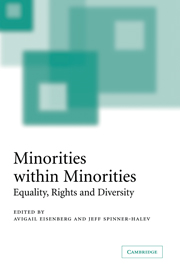Book contents
- Frontmatter
- Contents
- Notes on Contributors
- Acknowledgements
- Introduction
- Part I Toleration
- Part II Equality
- Part III Individual autonomy
- 7 Autonomy, association and pluralism
- 8 Sexual orientation, exit and refuge
- 9 On exit
- 10 Minors within minorities: a problem for liberal multiculturalists
- 11 Beyond exit rights: reframing the debate
- Part IV Self-determination
- Part V Democracy
- References
- Index
11 - Beyond exit rights: reframing the debate
Published online by Cambridge University Press: 22 September 2009
- Frontmatter
- Contents
- Notes on Contributors
- Acknowledgements
- Introduction
- Part I Toleration
- Part II Equality
- Part III Individual autonomy
- 7 Autonomy, association and pluralism
- 8 Sexual orientation, exit and refuge
- 9 On exit
- 10 Minors within minorities: a problem for liberal multiculturalists
- 11 Beyond exit rights: reframing the debate
- Part IV Self-determination
- Part V Democracy
- References
- Index
Summary
One of the hallmarks of liberal democratic societies is their thriving associational life. People belong to all kinds of different groups. The fairly robust guarantees of freedom of association that exist in most modern democracies have given rise to a cornucopia of forms of groups, whose members associate under often very different terms with a view to all kinds of ends.
Many such groups organize their internal affairs illiberally. That is, they enforce norms that run foul of the commitments to freedom and equality characteristic of liberal democracies. They are often structured in highly authoritarian ways. They tend not to respect the principle of gender equality which liberal democracies strive to live by. And in certain cases, they impose what would from a liberal standpoint seem like unacceptable physical abuse upon some of its members, including children.
How should the liberal state respond to such breaches of liberal principles? One prominent view, which presently dominates the philosophical literature on the subject, is that the state should abstain from intervening in the internal affairs of groups, so long as their members are provided with robust exit rights. When nothing objectively stands in the way of an individual terminating her membership in a group, and she chooses nonetheless to remain despite what might appear to others as harsh treatment, then the inference that ought to be drawn by the state is that she considers that continued membership in the group is worth more to her, all things considered, than the cessation of harsh treatment.
- Type
- Chapter
- Information
- Minorities within MinoritiesEquality, Rights and Diversity, pp. 227 - 246Publisher: Cambridge University PressPrint publication year: 2005
- 8
- Cited by

